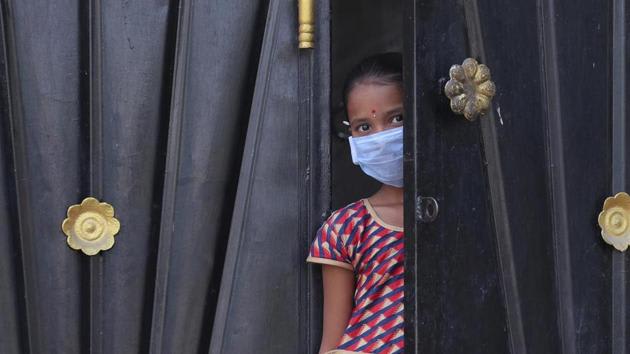
The number of deaths from the coronavirus disease (Covid-19) topped 100 on Sunday as the total infections crossed 4,000 - 503 of them in Delhi - with the central government pegging the doubling rate of the pathogen's spread at 4.1 days, a figure it said would have stood at 7.4 in the absence of the Nizamuddin cluster.
Sixteen fresh deaths and 514 new infections were reported on Sunday, the 12th day of a national lockdown that has been put in place to break the chain of infections. "Our focus is that we chase the virus, rather than the virus chasing us," health ministry joint secretary Lav Agarwal said during a news briefing.
The recent spike in infections has largely been propelled by the detection of hundreds of patients who attended the congregation of the Tablighi Jamaat, a Muslim missionary group, in New Delhi's Nizamuddin Basti last month in a violation of several restrictions. Cases linked to the meet have been reported across 17 states and Union Territories so far.
In Delhi, the number of Covid-19 cases climbed to 503 and the death toll rose to seven, with 58 fresh cases and one death being reported. The cases included 320 people who took part in the religious congregation in Nizamuddin. A 52-year-old man admitted at the Maharaja Agrasen hospital was the seventh person to die in the national capital.
"If the Tablighi Jamaat incident had not taken place and we compare the rate of doubling — that is in how many days the cases have doubled, we will see that currently it is 4.1 days (including Jamaat cases) and if the incident had not taken place and additional cases had not come, then the doubling rate would have been 7.4 days," Agarwal said.
Eight Malaysian attendees of the congregation were on Sunday offloaded from a special chartered flight to Malaysia from Delhi.
In Tamil Nadu, 86 people, including 85 returnees from the Tablighi Jamaat meet, tested positive on Sunday, taking the total number of cases in the state to 571. Sunday was the fifth straight day the state witnessed a sharp rise in the number of positive cases linked to the Nizamuddin congregation.
Experts say that the nationwide lockdown, one of the few weapons against the highly contagious infection that has killed 67,000 worldwide, will not achieve its objective if the positive cases originating out of such clusters are not contained in time.
In Mumbai, eight people died of Covid-19, while the number of positive cases in the financial hub increased by 103 to touch 433, the Brihanmumbai Municipal Corporation (BMC) said. This took the total number of deaths in Mumbai to 30, the highest in the country.
The Union health ministry said that 505 new Covid-19 cases and 15 deaths were reported since Saturday and the total Covid-19 cases were 3,577, with the death toll being 83. However, a tally by Covid19india.org that was cross-checked by HT, showed that the number of cases stood at 4,198, with 114 deaths. There is a lag in the Union health ministry's data when compared to that of states. Officials say this is because of procedural delays in state-wise cataloguing of cases.
An official of the Indian Council of Medical Research (ICMR) said that Sars-CoV-2, the virus that causes Covid-19, is not airborne. "If it was an airborne infection, then in a family whoever has a contact they all should come positive because they are living in same surrounding as the patient and the family is breathing the same air. When someone is admitted in hospital, other patients would have got exposure (if it was airborne) but that is not the case," said Raman R Gangakhedkar, head of epidemiology and communicable diseases at ICMR.
ICMR has issued an advisory that said spitting in public places could enhance the spread of Covid-19. On the question of rapid antibody tests, Gangakhedkar said test kits should be available by Wednesday.
The country's apex biomedical research organisation on Saturday released an advisory on how and where to use the rapid test, which can determine the immunity of an individual and help people get back into the workforce. The advisory includes people in high-risk areas (containment zones), large migration gatherings and evacuation centres. A task force constituted to review the testing guidelines did not open up rapid testing to the private sector.
At the briefing, Agarwal said cabinet secretary Rajiv Gauba held a meeting with district magistrates, superintendents of police, chief medical officers, state and district surveillance officers, state health secretaries, district health secretaries and chief secretaries to review the situation.
District officials shared strategies on how they delineated containment and buffer zone, how they carried out door-to-door survey through special teams and how through telemedicine and call centres people who came from foreign countries were monitored.
Covid-19 cases have been reported in 274 districts (till Sunday afternoon) and the cabinet secretary requested all DMs to maintain uniformity in their response and establish a crisis management plan, he said.
The government said all states were asked to put in place a district-specific containment strategy in place based on the detailed large outbreak control plan issued by the health ministry on Saturday. "Surveillance and contact tracing has been our main focus, and we will continue to put emphasis on that," said Agarwal.
Sign on to read the HT ePaper epaper.hindustantimes.com